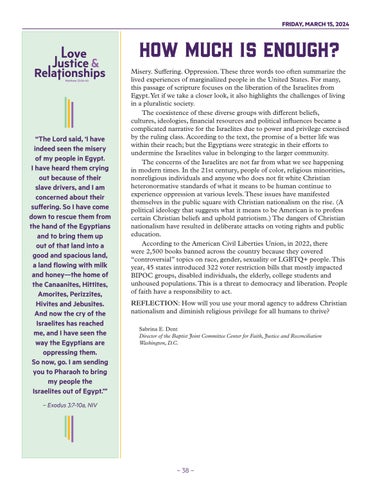FRIDAY, MARCH 15, 2024
How Much Is Enough?
“The Lord said, ‘I have indeed seen the misery of my people in Egypt. I have heard them crying out because of their slave drivers, and I am concerned about their suffering. So I have come down to rescue them from the hand of the Egyptians and to bring them up out of that land into a good and spacious land, a land flowing with milk and honey—the home of the Canaanites, Hittites, Amorites, Perizzites, Hivites and Jebusites. And now the cry of the Israelites has reached me, and I have seen the way the Egyptians are oppressing them. So now, go. I am sending you to Pharaoh to bring my people the Israelites out of Egypt.’”
Misery. Suffering. Oppression. These three words too often summarize the lived experiences of marginalized people in the United States. For many, this passage of scripture focuses on the liberation of the Israelites from Egypt. Yet if we take a closer look, it also highlights the challenges of living in a pluralistic society. The coexistence of these diverse groups with different beliefs, cultures, ideologies, financial resources and political influences became a complicated narrative for the Israelites due to power and privilege exercised by the ruling class. According to the text, the promise of a better life was within their reach; but the Egyptians were strategic in their efforts to undermine the Israelites value in belonging to the larger community. The concerns of the Israelites are not far from what we see happening in modern times. In the 21st century, people of color, religious minorities, nonreligious individuals and anyone who does not fit white Christian heteronormative standards of what it means to be human continue to experience oppression at various levels. These issues have manifested themselves in the public square with Christian nationalism on the rise. (A political ideology that suggests what it means to be American is to profess certain Christian beliefs and uphold patriotism.) The dangers of Christian nationalism have resulted in deliberate attacks on voting rights and public education. According to the American Civil Liberties Union, in 2022, there were 2,500 books banned across the country because they covered “controversial” topics on race, gender, sexuality or LGBTQ+ people. This year, 45 states introduced 322 voter restriction bills that mostly impacted BIPOC groups, disabled individuals, the elderly, college students and unhoused populations. This is a threat to democracy and liberation. People of faith have a responsibility to act. REFLECTION: How will you use your moral agency to address Christian nationalism and diminish religious privilege for all humans to thrive? Sabrina E. Dent Director of the Baptist Joint Committee Center for Faith, Justice and Reconciliation Washington, D.C.
– Exodus 3:7-10a, NIV
– 38 –
